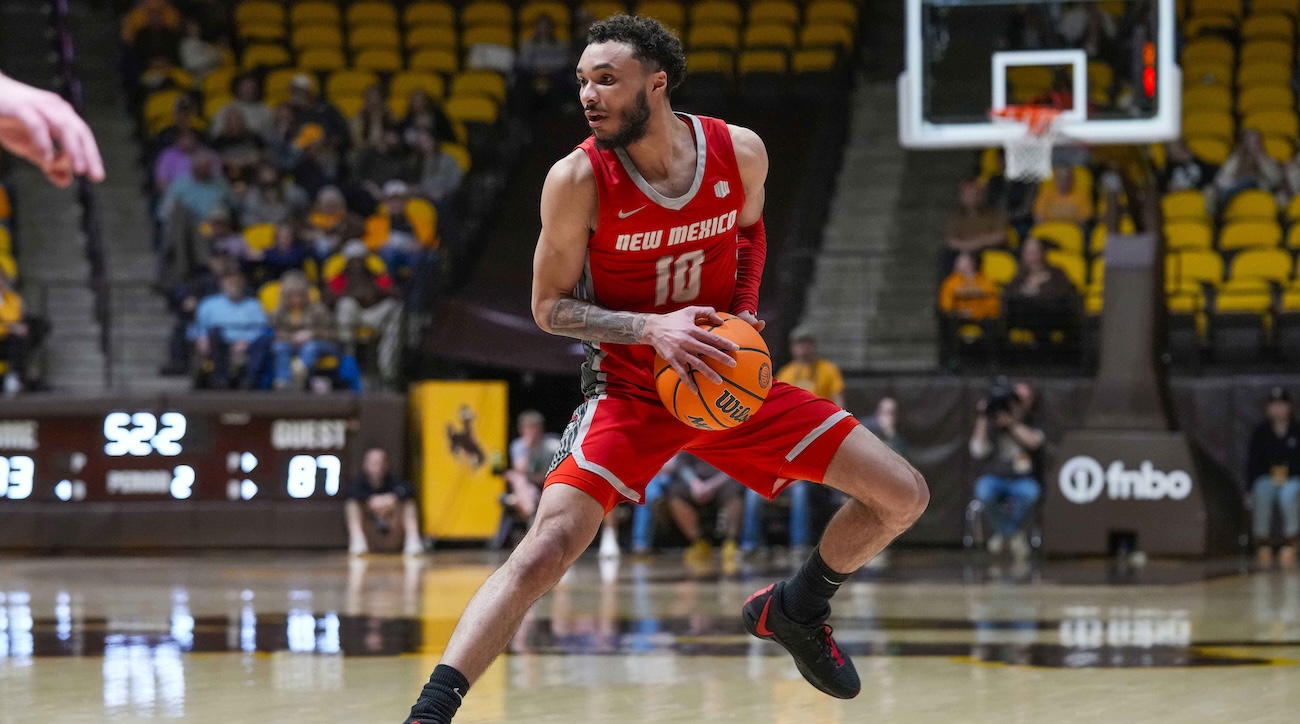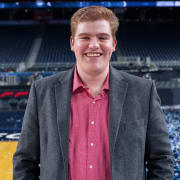Mountain West Takes Torch of Hottest Men’s Basketball Conference on West Coast

The center of the men’s college basketball conference tournament week universe is Las Vegas. Five tournaments call Sin City home, with essentially the entire West Coast converging on the city for a week of wall-to-wall college hoops.
This year’s trip to the desert was a bittersweet one. Conference realignment’s biggest victim is the presence of a so-called power conference out West, with the Pac-12 dissolving in what can best be described as a consolidation of power at the top of college sports. This week’s action marked the final Pac-12 men’s tournament before its schools split off for good.
But the vibe of the week wasn’t one of mourning. Instead, it was a changing of the guard. While the Pac-12 played its tournament in glitzy T-Mobile Arena on the Strip, equipped with a fan fest and signage everywhere, the attention of many in college basketball was all on the Mountain West tournament, played at the Thomas & Mack Center at UNLV. Odds are strong that the Mountain West will double up the Pac-12 in NCAA men’s tournament berths this season, and the quality of the product on display all week backed that up. The Pac-12 may outpace the Mountain West in budgets, TV deals or the other measuring sticks that have now taken over college sports boardrooms, but the on-court results are telling a different story.
“The Mountain West Conference has been so good throughout my 11 years in it, but it’s never been at the level it’s been this year,” Nevada Wolf Pack coach Steve Alford said Thursday. “This is the best it’s ever been.”
[ 2024 March Madness: Latest News & Analysis ]
Mountain West hoops have been on an upward trajectory since the 2020 season, when the league added a second team to the field with a buzzer-beating three by the Utah State Aggies’ Sam Merrill in the tournament championship game. The league had two at-large–caliber teams in ’21 and sent four teams dancing in both ’22 and ’23, big steps forward. But this season brought a breakthrough even its most optimistic supporters might have found unrealistic: six teams, more than half of the conference, going dancing. That’s more overall bids than the Pac-12 and ACC and could well be more than the Big East, which has three teams as bubbly as they come heading into Selection Sunday. Even the mighty Big Ten, among the new “Power 2” leagues, seems likely to also get just six teams in.
The six-bid dream has felt like a possibility since mid-January after the league did strong work in the nonconference. The league’s official account started tweeting the hashtag #SixBidMW in mid-January, and the chorus of hope has crescendoed to perhaps the league’s most prominent talking point throughout February and into March. The video board beneath the scorer’s table all week featured messages like “Best in the West,” flexing stats about the league’s 24–7 record against Pac-12 and WCC teams. Media members were handed a sheet with #SixBidMW across the top, detailing the tournament cases for all six teams in tournament contention.
“When we started campaigning for it, we thought it was a possibility. Today, I feel strongly it’s deserving,” Mountain West commissioner Gloria Nevarez says. “We wouldn’t have done that if we didn’t have the stats to back it up. It wasn’t aspirational, it was backed by performance.”

Five teams from the league entered the week comfortably in the field: the defending national runner-up San Diego State Aztecs, Utah State, Nevada, Boise State Broncos and Colorado State Rams. The New Mexico Lobos were the league’s question mark after a brutal home loss to the Air Force Falcons in February, but the Lobos roared to life in Las Vegas. Even before upsetting San Diego State in the title game to clinch an automatic bid, New Mexico added a pair of Quad 1 wins over Boise State and Colorado State in consecutive days to bolster its résumé, and UNM came into Saturday in the top 25 nationally in both the NET and KenPom. Its performance in Vegas not only ensures that the Lobos dance, but they’ll avoid the First Four in Dayton … as should all five other tournament teams. That’s particularly notable since one of the league’s four bids has been sent to Dayton each of the past two years.
The Lobos might be the poster child for what makes the Mountain West such a compelling product today. They play home games at the famous Pit in Albuquerque, which sold out its 15,411-person capacity several times this season and ranked in the top 15 nationally in attendance a season ago. Lobo fans travel, too, out-representing pretty much any other fan base in Vegas this week other than perhaps the Arizona Wildcats, a borderline blue blood.
They’re coached by Rick Pitino’s son, Richard, who has pulled off a remarkable three-year turnaround to reverse the fortunes of a program decimated during the pandemic. The Lobos’ roster is loaded, with sophomore Donovan Dent and freshman JT Toppin on NBA radars and veterans like Jaelen House and Jamal Mashburn Jr. who each could have easily moved on to power conference schools last spring in the transfer portal. They play at a breakneck pace, with House the head of the snake. His showing in Vegas barking at the crowd and making bold proclamations in postgame television interviews gave off shades of Ole Miss Rebels legend Marshall Henderson. If the team that won four games in four days this weekend shows up, no one in the country will want to see them in the Big Dance.
Meanwhile, San Diego State and Utah State each stake their claim to owning the best homecourt advantage out West, with electric home atmospheres widely recognized as some of the sport’s best. The Aztecs have been among the sport’s most consistent programs at any level for the better part of two decades. Utah State is on its third coach in four years and will have gone dancing with all of them. There’s parity league-wide, especially this season, where four games separated first and seventh in the conference standings and every team lost four or more times.
“It’s a great year for the league and three years in a row now, and I hope we can keep that in a momentum [that] goes because it’s a lot of fun,” Colorado State coach Niko Medved said Thursday. “It’s not fun to coach every night in the league, but it’s sure as heck a lot of fun to compete in it.”
With the Pac-12 vanishing, now there’s no competition for the crown of college basketball’s West Coast epicenter. And the league having this type of breakthrough in the face of all the headwinds that challenge the “have-not” programs of modern college sports is a very positive sign for the future. It may not quite be the Big East in terms of its cultural significance or March track record, but why can’t it be the Western equivalent? Getting people to care about Pac-12 basketball in major metros like Seattle, the Bay Area and even Los Angeles has been a chore; the Mountain West runs into no such problems in Albuquerque, San Diego and college towns like Logan, Utah, and Fort Collins, Colo.
“A lot of our schools are the only show in town and just generate that kind of commitment,” Nevarez says. “I’ve worked a lot of basketball tournaments and I’ve been at sellout crowds, but [nothing like] this atmosphere that’s being contributed by five, six, seven schools bring.”
There was no question which atmosphere was better this week between the Pac-12 and Mountain West. The basketball on display wasn’t a close fight either. Mountain West games felt bigger, more important, more competitive. The league’s impending big Selection Sunday will mark a true passing of the torch.
West Coast college basketball officially runs through the Mountain West.
